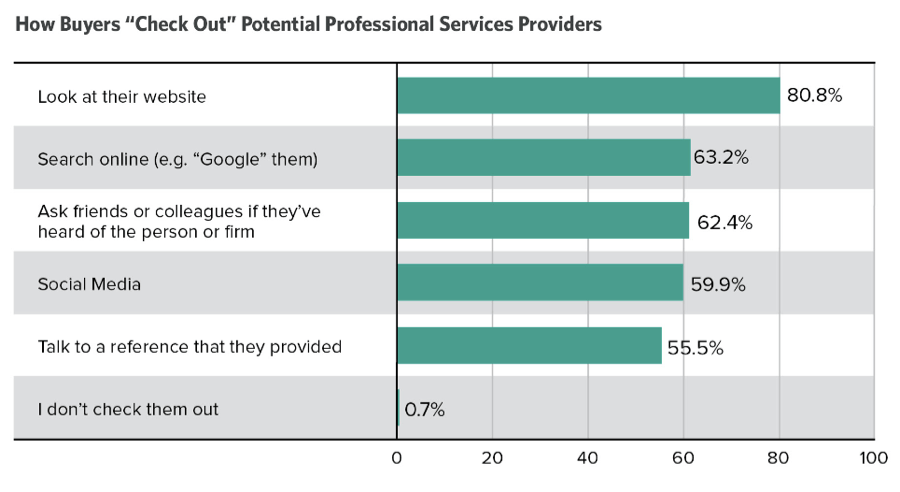Did you know you’re being watched? Your tech services firm is under online scrutiny by prospective clients—at least, it should be. Here’s what our research tells us about how professional services firms as a whole are being checked out these days:

So if your website’s not converting viewers or if visitors leave your site right away, take a look at the copy on your website, as well as any educational content you are offering to visitors. How is it written? Is it easy to skim? Is it intuitive what a user should do next?
We’re not all top-notch writers. And knowing how to write for the web is not as simple as knowing verb-subject agreement. Even if you’re on top of your grammar, effective web copy is challenging in that you have distill everything you know about your firm and your expertise into succinctly worded paragraphs, or even bullets, that any reader can quickly digest.
Here are ten website copywriting tips to keep in mind as you craft or revamp the language on your website:
- Write well. We’ve heard it a million times: quality over quantity. This applies doubly for website copywriting. Focus on making your copy readable and relatable. As a tech services firm, you deal in subject matter that can be complex and confusing, not to mention full of industry jargon and acronyms. Whenever possible, use plain language in place of technical jargon—make sure the writing is easily skimmable. When you’re done, read your text out loud. The most effective website copy is less formal, even conversational. And reading aloud will reveal otherwise invisible typos and awkward phrasings.
- Your goal should be to educate your target audience, not throw a sales pitch at them. Don’t scream in bold letters about being the best. Instead, teach your readers something about your area of expertise, and let your readers realize that you’re the best choice. When a client comes to the conclusion on their own that you’re the firm they want to work with, they’re far more likely to stick to it.
- In your website’s blog, focus on writing posts that answer the questions your prospective clients face. Connect emotionally with them by telling a story (think case stories) and empathizing with their challenges. But don’t get too abstract—use how-tos and practical, tangible language to demonstrate that there are achievable solutions to their problems.
- Include a Call-to-Action (CTA). Getting prospect to actually read what’s on your website is just the beginning — you want them to do more. Where appropriate, include a call to action or an “offer” to encourage interested readers to take an incremental next step. This could be as simple as “Register Here” (for a free webinar, perhaps) or “Download Now” (for a white paper or research report or case study).The key is to make it very clear what action you want the reader to take. If a reader has to wonder what clicking a button will do, they are less likely to take any action at all.
 Use keywords, and target one keyword per page. Can enough be said about SEO? The short answer is, no. Search engine optimization is a technique designed to make your content accessible to interested audiences and help key pages on your website rank well in Google. A couple of considerations:
Use keywords, and target one keyword per page. Can enough be said about SEO? The short answer is, no. Search engine optimization is a technique designed to make your content accessible to interested audiences and help key pages on your website rank well in Google. A couple of considerations:
- Use relevant keywords: Perform keyword research to be sure you understand what terms your audiences are searching for. You’ll also need to consider your website’s capacity to rank for those keywords.
- Try Google’s Keyword Planner to search for keyword areas and check their volume and competition metrics. Type in the topic areas you want to write about and Keyword Planner will return specific keyword clusters and keyword phrases that are related to the topic. It’s primarily a tool for Google Adwords users, but it’s also a great tool for finding keywords to use in your website content. Effective keywords balance volume, difficulty, and relevance. You can use Google’s Keyword Planner in conjunction with a tool like Moz’s Keyword Explorer to compare volume with difficulty.
- You want to aim for keywords that have rankings close to or lower than your own website authority, and then incorporate the keywords into page titles, title tags, meta descriptions and the content itself. However, in order to determine keyword difficulty, you must know your own website authority. Which leads us to…
Build website authority through strategic linking: Domain Authority and Page Authority are a pair of metrics developed by web marketing firm Moz to simulate Google’s ranking algorithm. Domain Authority assigns your domain (essentially, your entire website) a number from 0 to 100. This is a logarithmic scale, so moving from 70 to 71 is much harder than rising from 10 to 11. Page Authority serves the same function, but it applies to individual pages on your site.
Authority is assigned according to a host of factors, including the number and quality of links pointing to your pages, the freshness and popularity of your content, and many other characteristics. Links back to your site from reputable outside websites, in particular, encourage web traffic, and they help search engines determine the quality and relevance of your website. Think of a link as vote for a page on your site, but some votes (from large, reputable sites, for instance) count more than others. A good way to create inbound links is to publish guest blogs or articles on high-quality, third-party websites. Be sure to include one or more links back to relevant educational material on your website.
By embracing a keyword strategy, you will not only attract the right audience, you will attract the right kind of attention (i.e., traffic) from Google, as well. Which ultimately leads to greater online visibility.
- Optimize body content. Make sure you use your carefully chosen keyword in the title of your page, but you’ll want to incorporate it into your body content, as well. Shoot for using it 2 to 4 times in your body text, depending on the amount of copy.And be careful when dropping in those keywords — you don’t want them to feel random or forced. If you’re having trouble fitting a particular keyword into a passage, maybe you’ve picked the wrong keyword — or the wrong topic. If your keyword consists of two or more words, it’s okay to alter the word order or even substitute a synonym in the body text. Google is smart enough today to understand your intent.
- Optimize images. Optimizing your images is important too. It’s as simple as using the keyword you choose in your images’ filenames and alt text. It’s also good practice to minimize the file sizes of your images so your pages will load as fast as possible.
- 300+ words. Research has shown that web pages that contain 300 or more words tend to rank better and draw more readers. Some studies indicate that Google may be giving preference to even longer content: 2,000 words or more. But don’t get hung up about length. Many shorter pages rank well, too. Remember to keep #1 in mind—quality over quantity—but saying enough matters too.
- Share. Again, it’s not all about the writing. You’ve got to get social and share your content. If possible, include buttons on your educational content that make it easy for your readers to connect to you and share your content with their own audiences.
- Show off. What high profile clients or impressive certifications or awards do you have under your belt? Let the world know. If you’ve paid attention to tip #2 (educating your audience), you’ve in effect earned permission to show off.Drop the names of brands or partners you’re associated with. The prestige and credibility of your connections can go a long way toward boosting your own reputation. And when you mention individuals, companies, and partners in a post, they will often respond by sharing the post with their list. Everyone wins.
These ten tips cover just a few of the basics. There’s always more to learn about copywriting best practices and optimization. But if you follow the advice above, your website copywriting efforts will be rewarded: increased traffic, a higher conversion rate, and more leads coming your way.
Additional Resources:
- Our Lead Generating Website Guide details how your firm can generate qualified leads with its website.
- Ensure that your website and content gets found online with Hinge’s SEO Guide for Professional Services.
- Join Hinge University and get access to a wealth of step-by-step instructions, video courses, and in-depth materials that will help you make the most of your website copywriting and SEO.
How Hinge Can Help:
Your B2B website should be one of your firm’s greatest assets. Our High Performance Website Program helps firms drive online engagement and generate new leads and revenues. Hinge can create the right website strategy and design to take your firm to the next level.

